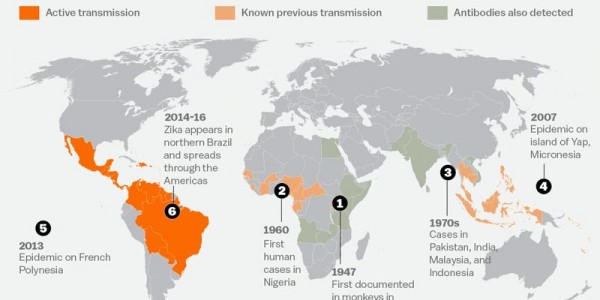Are your patients/clients headed to the Olympic Games in Brazil?
If your patients or clients are heading to the Olympic Games in Brazil this summer, please make them aware of the following information about Zika virus.
There are no vaccines or medications currently available to prevent Zika virus infection. It is advised that pregnant women and women trying to get pregnant during their travels or immediately afterwards, consider postponing travel to areas where Zika virus is being transmitted, such as Brazil. If pregnant women, and those trying to conceive, are unable to avoid travel they should follow travel recommendation including seeking travel medicine advice prior to departing.
All travellers are advised to take precautions to avoid mosquito bites throughout the day and night, both indoors and outdoors, and are advised to:
- wear long-sleeved shirts and long pants
- use a recommended insect repellent according to instructions on the product label; those containing DEET (20%) (available at the VCH Travel Clinic) or icaridin (20%) are effective and safe for pregnant women
- use permethrin-treated clothing and gear
- stay and sleep in screened-in or air-conditioned rooms
- if staying outside, sleep under a mosquito bed net (available at the VCH Travel Clinic).
Pregnant women and women trying to get pregnant during their travels or immediately afterwards should consider avoiding travel to areas where a Zika outbreak is on going. Zika virus usually remains in the blood of an infected person for about a week. The virus will not cause infection in a baby that is conceived after the virus is cleared from the blood. It is probably safe for a woman who has travelled to a Zika infected area to wait 2 months after return before trying to conceive. Sexual transmission of Zika virus is very rare. A cautious approach is for men to wait 2 months after travel to a Zika infected area before trying to conceive.
If the man had a laboratory confirmed case of Zika virus he should wait 6 months after recovery until having unprotected sex. Some authorities are suggesting that men who have been in Zika-infected areas use a condom for the duration of pregnancy when their female partner is pregnant. This is probably an overly cautious approach and hopefully ongoing research will clarify all these issues and questions.
Testing patients
There are testing methods for detection of Zika virus. It is recommended that the following patients be assessed for testing:
- Travellers who have been to a Zika infected area and return with symptoms.
- Travellers who have been to a Zika infected area and become ill up to 15 days after returning.
- Pregnant travellers, with or without symptoms, who were pregnant during or within one month of returning from travel to a Zika infected area.
The Provincial Health Officer recommends that all pregnant women returning from Zika infected areas be offered Zika virus testing and a detailed ultrasound at 19-20 weeks gestation.
What countries are affected?
A current list of affected countries can be reviewed on the Government of Canada website.
What is Zika virus?
Zika virus is a Flavivirus transmitted by Aedes mosquitoes found in South America, Latin America and the Caribbean. Originally found only in Africa and Asia, the virus was first reported in the Western Hemisphere in 2015. Zika is from the same family of viruses as Dengue and West Nile Virus that are also transmitted by Aedes mosquitoes. Mosquito-borne transmission is overwhelmingly the dominant mechanism of Zika transmission. There have been reports, outside of Canada, of both sexual transmission and transmission of Zika virus through the blood supply. While most infections are asymptomatic or mild, Zika virus infection during pregnancy has been shown to cause microcephaly and other obstetrical complications. Rare post-infectious neurological complications have also been reported.
More info
For more information visit the VCH Travel Clinic website.

